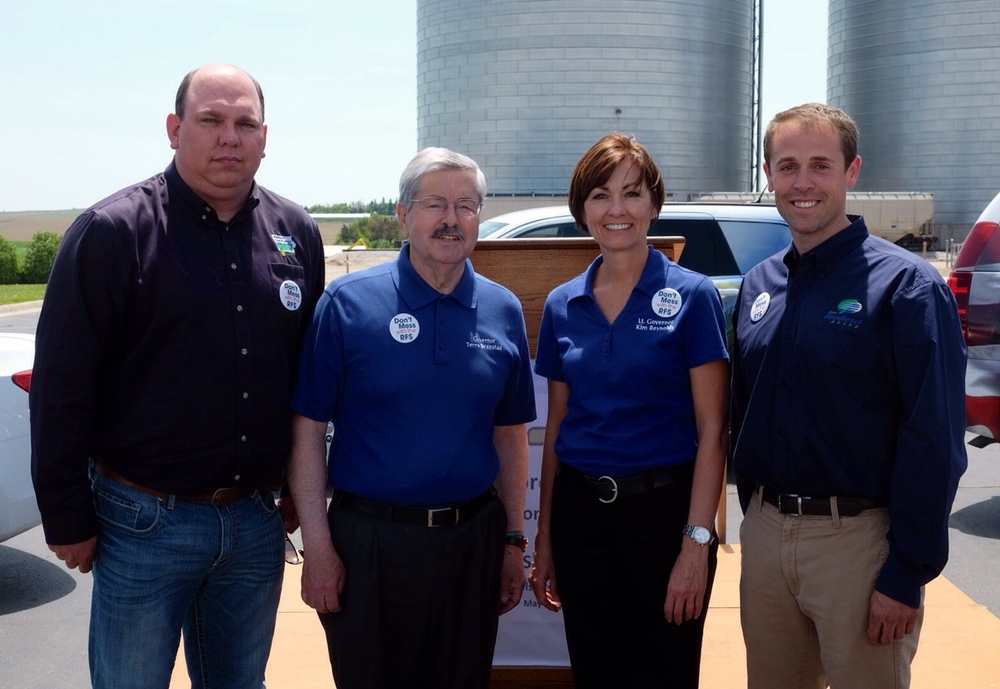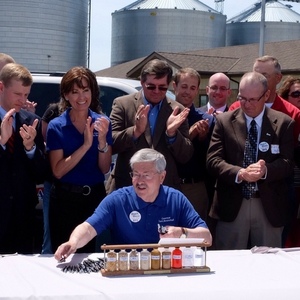Iowa provides stability for state's biodiesel producers



Photo: Iowa Biodiesel Board
May 22, 2014
BY The National Biodiesel Board
On May 21, Iowa Gov. Terry Branstad advanced support for the biodiesel industry signing into law an extension of the state’s biodiesel producer incentive.
“Iowa is a biofuels leader in this country and having states step to the plate with legislation supporting America’s advanced biofuel, biodiesel, is a win for our industry,” said Steven J. Levy, chairman of the National Biodiesel Board. “Our champions in Iowa have shown that hard work to grow this still-young industry pays off.”
The legislation is an extension of the current biodiesel producer incentive that is structured as a 2 cent per-gallon refundable credit for the first 25 million gallons produced at any single plant in the state. The incentive was set to expire at the end of this year but the extension now moves that through 2017.
With the fate of the federal biodiesel tax incentive and the renewable fuel standard (RFS) volumes currently uncertain, strong state biodiesel policies help stabilize the industry and provide a baseline for producers.
“Built on strong federal and state policy support the biodiesel industry produced nearly 1.8 billion gallons last year,” said Levy. “With record volumes of advanced biofuels being produced, now is not the time to back away from those policies that have proven to be successful in bringing fuel diversity to the marketplace.”
A group of biodiesel producers and other industry advocates joined six U.S. Senators at a press conference in Washington D.C. last week calling on Congress and the administration to act quickly to restore the industry’s progress by supporting a strong RFS and reinstating the federal tax incentive.
Biodiesel is the first and only commercial-scale fuel produced across the U.S. to meet the EPA’s definition as an advanced biofuel—meaning the EPA has determined that it reduces greenhouse gas emissions by more than 50 percent when compared with petroleum diesel. Produced in nearly every state in the country, the industry has exceeded RFS requirements in every year of the program and produced a record of nearly 1.8 billion gallons last year, supporting more than 62,000 jobs nationwide.
Advertisement
Advertisement
Related Stories
A bill to formally adopt a revenue certainty mechanism to support the production of SAF was introduced in the U.K. Parliament on May 14. The proposed scheme is in the form of a guaranteed strike price.
Delta Air Lines on May 7 announced its strong support for new bipartisan, bicameral legislation that will accelerate the growth of sustainable aviation fuel (SAF) in Michigan. The bill aims to create a SAF tax credit of up to $2 per gallon.
The U.S. EPA on May 14 delivered two RFS rulemakings to the White House OMB, beginning the interagency review process. One rule focuses on RFS RVOs and the other focuses on a partial waiver of the 2024 cellulosic RVO.
U.S. EPA Administrator Lee Zeldin on May 15 told members of the House Appropriations Committee that the agency is working as quickly as it can to take action on the backlog of RFS small refinery exemption (SRE) petitions.
The U.S. EPA on May 15 published data that shows eight new small refinery exemption (SRE) petitions have been filed under the RFS in the past month. According to the agency, 169 SRE petitions are now pending.
Upcoming Events










